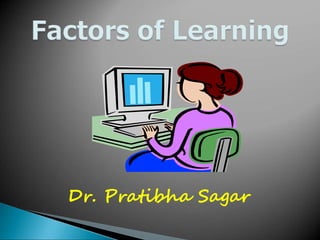Report
Share

Recommended
More Related Content
Similar to Factors of Learning.pdf
Similar to Factors of Learning.pdf (20)
Learning and Its relationship with Maturation, Attention and Interest

Learning and Its relationship with Maturation, Attention and Interest
Organizational Behavior: Learning and its theories

Organizational Behavior: Learning and its theories
More from Pratibha Sagar
More from Pratibha Sagar (20)
Recently uploaded
Recently uploaded (20)
Unit 3 Emotional Intelligence and Spiritual Intelligence.pdf

Unit 3 Emotional Intelligence and Spiritual Intelligence.pdf
Sensory_Experience_and_Emotional_Resonance_in_Gabriel_Okaras_The_Piano_and_Th...

Sensory_Experience_and_Emotional_Resonance_in_Gabriel_Okaras_The_Piano_and_Th...
QUATER-1-PE-HEALTH-LC2- this is just a sample of unpacked lesson

QUATER-1-PE-HEALTH-LC2- this is just a sample of unpacked lesson
Exploring_the_Narrative_Style_of_Amitav_Ghoshs_Gun_Island.pptx

Exploring_the_Narrative_Style_of_Amitav_Ghoshs_Gun_Island.pptx
NO1 Top Black Magic Specialist In Lahore Black magic In Pakistan Kala Ilam Ex...

NO1 Top Black Magic Specialist In Lahore Black magic In Pakistan Kala Ilam Ex...
dusjagr & nano talk on open tools for agriculture research and learning

dusjagr & nano talk on open tools for agriculture research and learning
Factors of Learning.pdf
- 2. Starts right from birth Continues till death All living creatures learn evolves over time can only by inferred, not directly observed is closely linked to perception
- 3. A relatively permanent influence on behaviour, knowledge, and thinking skills, which comes about through experience. Once something new is learned, the previous skills are not lost. Examples include driving a car, operating a computer and downhill skiing etc.
- 4. Capacities that are inborn or innate Examples include swallowing, flinching at loud noises, and blinking Changes due to growth and maturation are not learning. Examples include physical growth of a person
- 5. changes that are temporary due to illness, fatigue, maturation & use of intoxicants etc., are not "learned".
- 7. Learning and maturation are closely related. For learning a definite level of maturation is essential. Learning is relatively permanent influence on behaviour as a result of experience whereas maturity is related to growth & development of a child.
- 8. Learning is a psychological / mental process whereas maturity is biological/ physiological process. In the process of learning, practice is an important factor whereas there is no importance of practice in process of maturity.
- 9. Learning is continuous process and maturity starts from certain period and ends at certain period.
- 11. “Learning is some change in the behaviour of the organism as a result of experience which is retained for at least a certain period of time” - Morgan & Gilliland
- 12. “Learning is shown by a change in behaviour as a result of experience. ” – Cronbach “Learning is the acquisition of habits, knowledge and attitudes. ” – Crow and Crow
- 13. “The process of acquiring new knowledge and new responses is the process of learning ” - Woodworth "Learning is the acquisition of new behaviour or the strengthening or weakening of old behaviour as the result of experience.” – Henry P. Smith
- 17. Motivation Emotional State Intelligence
- 18. Attention, Interest and Aptitude Will to learn
- 20. Maturation Sense Organs Physical Health
- 23. Suitable Atmosphere Work time and fatigue
- 25. The learner himself Age of learner Educational Background
- 26. Knowledge of subject Knowledge of Psychology Communication skills
- 27. Methods of teaching Personality Informational feedback
